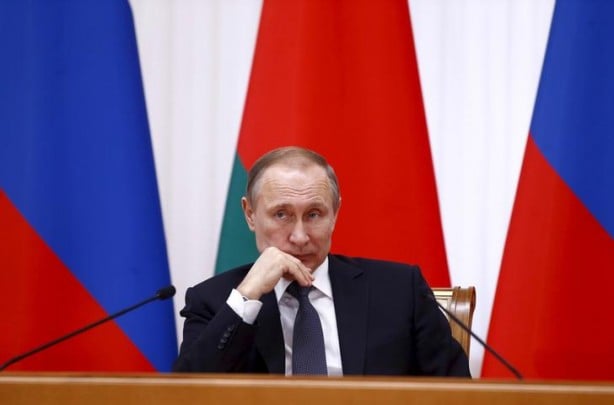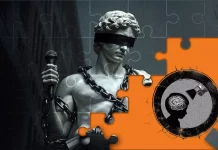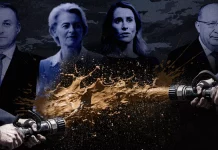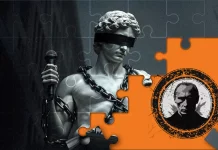
If Russian officials are to be believed, the reason people worry about what Russia might do next is because they suffer from Russophobia, an irrational fear of all things Russian.
In February, Russian Foreign Minister Sergei Lavrov assailed the “fashion of Russophobia in certain capitals” during a visit to Germany. Then Russia’s defense ministry accused General Philip Breedlove of Russophobia. The commander of U.S. forces in Europe had testified that the United States and its allies were “deterring Russia now and preparing to fight and win if necessary” following the Kremlin’s military adventures in Ukraine and Syria.
“Russophobe” has become a convenient label for anyone who disagrees with Russian President Vladimir Putin’s aggressive behavior at home and abroad. You are not criticizing an authoritarian leader and his erratic policies; you are instead attacking the Russian nation.

Russian President Vladimir Putin (R) and Foreign Minister Sergei Lavrov at the Kremlin in Moscow, March 2, 2016. REUTERS/Maxim Shemetov
Russia’s state media churns out reports on how enemies are tirelessly seeking to isolate the country — when in fact it is Putin’s own actions that are closing off Russia.
When I first visited Moscow as a college student 25 years ago, the Soviet Union was in its last year of existence. Kremlin reformer Mikhail Gorbachev was opening up the country after more than seven decades of communism, and Russians were hungry to rejoin the world. Goodwill, curiosity and hope were the overriding feelings among Russians and Americans alike. My host parents in Moscow even displayed a picture of then-President George H.W. Bush in their living room.
The Cold War was finally over. I was fascinated by the parallel world that had existed behind the Iron Curtain and shocked by the deprivations that people endured. Later, as a journalist based in Moscow, I would encounter dozens of Russians who welcomed me into their homes and hearts. It helped, of course, that I tried my damnedest to speak Russian. But it never hurt to be American. Often it was an advantage.
My initial interest in Russia led me to explore other countries that had belonged to the Soviet empire: Ukraine, Poland, the Baltic states, the Central Asian republics. Although anti-Russian rhetoric has cheapened the political discourse in those places, the Russian language is still widely understood, if not actively used. Given their difficult history with Russia, eastern European countries viewed membership in the North Atlantic Treaty Organization as a prudent defensive measure. Putin’s surprise attack on Ukraine proved them right.

Mikhail Gorbachev in 1987. Wikipedia/Commons
To me, the folly of Russophobia became most obvious in Ukraine. Most of my Ukrainian friends speak Russian as their first language, and many have parents or grandparents from Russia. They aren’t afraid of Russia but of its revanchist, autocratic government.
The crux of the problem between Russia and its former satellites is that nationalism was the driving force behind the independence movements that split apart the Soviet Union. Estonians, Lithuanians and Georgians knew who they were and what they wanted: their own countries.
But from Russians’ perspective, it looked like their neighbors were abandoning them. Russians never had to liberate themselves from the Soviet Union: They just woke up one day in its ideological ruins. Not surprisingly, Russian nationalism today ties together a jumble of monarchist, Orthodox Christian and communist strands.
The appeal of Russophobia isn’t just based on resentment about the breakup of an empire. It’s also rooted in the frustration that the Western model of governance proved a more attractive way of running a country.
Putin, now in his 17th year of ruling Russia, is preoccupied with regime survival. That’s one reason the Kremlin is working so hard to discredit liberal democracy as a system of government. Telling Russians to fear the West because the West hates Russia is a way of distracting the population from the deficiencies of one-man rule.
Ever since my first visit to Russia in 1991, Russians have asked me why I decided to learn their language and travel to their country. People were incredulous that an American without any Russian roots could be so interested in their country.
My answer was simple: the mellifluous Russian language, the richness of Russian literature, the vastness of the country’s geography and the diversity of its peoples. It was all about what Russians themselves call the “Russian soul” — a generosity of spirit and a knack for improvisation amid adversity.
In their bluster about a brave new Russky Mir (“Russian world”) to redeem the perceived humiliations of the past, Russia’s current rulers are putting their own insecurities on full display. In the process, they have squandered the country’s greatest resource, which isn’t oil and gas but Russia’s enormous soft power.
Ironically, the biggest Russophobes inhabit Russia’s highest political offices. They are the people who believe the essentialist argument that the Russian people are too immature for real democracy and can only be ruled by a strong leader.
Russophobia isn’t an international problem. It’s a domestic one.
By Lucian Kim, Reuters





